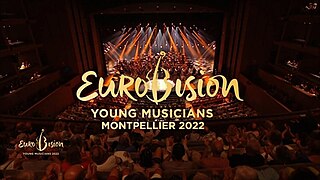
Switzerland has participated in the Eurovision Song Contest 64 times since its debut at the first contest in 1956, missing only four contests because of being relegated due to poor results the previous year: 1995, 1999, 2001, and 2003. Switzerland hosted the inaugural contest in 1956 in Lugano, where it also won. The country claimed its second victory in 1988, 32 years after the first, and its third in 2024, 36 years after the second win. The Swiss participant broadcaster in the contest is the Swiss Broadcasting Corporation.

Latvia has participated in the Eurovision Song Contest 24 times since making its debut at the contest in 2000, where the song "My Star" performed by the group Brainstorm finished third. Latvia won the contest in 2002, with the song "I Wanna" by Marie N, defeating Malta by 12 points. Latvia is the second former Soviet country to win the contest. The 2003 contest was held in the Latvian capital Riga. The country achieved its third top 10 result in 2005, when "The War Is Not Over" by Walters and Kazha finished fifth. The Latvian participant broadcaster in the contest is Latvijas Televīzija (LTV), which select its entrant since 2015 with the national selection Supernova.

The Netherlands has participated in every edition of the Junior Eurovision Song Contest since its inception in 2003. The country has won the competition on one occasion; in 2009, with the song "Click Clack" by Ralf Mackenbach. Dutch broadcaster AVROTROS has been responsible for the participation, selecting the nation's entrant through the national final Junior Songfestival. The Netherlands is the only country to have taken part in every edition of the contest.

Sweden has participated at the Junior Eurovision Song Contest eleven times since its inception in 2003. Two broadcasters have been responsible for Sweden's entries at Junior Eurovision – from 2003 to 2005, Sveriges Television (SVT) was responsible, before withdrawing with other Nordic broadcasters. From 2006 to 2009, commercial broadcaster TV4 was responsible for Sweden's entry at the Junior Eurovision.

Norway has participated in the Junior Eurovision Song Contest three times and was the host of the 2004 Contest, held in the Norwegian city of Lillehammer.

The participation of Portugal in the Junior Eurovision Song Contest first began at the Junior Eurovision Song Contest in 2006 which took place in Bucharest, Romania. Rádio e Televisão de Portugal (RTP), a member of the European Broadcasting Union (EBU), were responsible for the selection process of their participation. Portugal used a national selection format, broadcasting a show entitled "Festival da Canção Junior", for their participation at the contests. This was a junior version of Festival da Canção, the national music competition organised by broadcaster RTP to choose the Portuguese entry for the Eurovision Song Contest. The first representative to participate for the nation at the 2006 contest was Pedro Madeira with the song "Deixa-me sentir", which finished in second-last place out of fifteen participating entries, achieving a score of twenty-two points. Their worst result to date has been achieved by Rita Laranjeira with her song "Gosto de tudo " in the Junior Eurovision Song Contest 2018 where she placed 18th. Portugal withdrew from competing in 2008, and returned in 2017. They withdrew again in 2020 due to the COVID-19 pandemic. Portugal returned in 2021, where they achieved 11th place, their best result up to that point. In 2022 the country surpassed this record and reached 8th place.

Ukraine has participated in the Junior Eurovision Song Contest since 2006. Ukrainian public broadcaster UA:PBC, has been responsible for the participation.

Eurovision Young Musicians, often shortened to EYM, or Young Musicians, is a biennial classical music competition for European musicians that are aged between 12 and 21. It is organised by the European Broadcasting Union (EBU) and broadcast on television throughout Europe, with some countries holding national selections to choose their representatives for the contest.

Armenia has participated in the Junior Eurovision Song Contest since 2007. Armenian Public Television (ARMTV), a member organisation of the European Broadcasting Union (EBU), have been responsible for the selection process of their participants since their debut.

The participation of Georgia in the Junior Eurovision Song Contest first began at the Junior Eurovision Song Contest in 2007 which took place in Rotterdam, Netherlands. The Georgian Public Broadcaster (GPB), a member organisation of the European Broadcasting Union (EBU), have been responsible for the selection process of their participants since their debut. The first representative to participate for the nation at the 2007 contest was Mariam Romelashvili with the song "Odelia Ranuni", which finished in fourth place out of seventeen participating entries, achieving a score of one hundred and sixteen points. Since their debut, Georgia has never missed an edition of the contest, with three of these participations resulting in a win. These wins occurred in 2008, 2011 and 2016, making Georgia the most successful country in the contest, alongside France. They hosted the contest for the first time in 2017 at the Olympic Palace in Tbilisi.

Italy debuted at the Junior Eurovision Song Contest when the twelfth edition of competition was held in Malta in 2014.

The participation of Slovenia in the Junior Eurovision Song Contest first began at the twelfth edition of the Junior Eurovision Song Contest in 2014 which took place in Marsa, Malta. Radiotelevizija Slovenija (RTVSLO), a member organisation of the European Broadcasting Union (EBU), were responsible for the selection process of their participation. Slovenia originally used an internal selection format for their participation at the 2014 contest. The first representative to participate for the nation at the 2014 contest was Ula Ložar with the song "Nisi sam ", which finished in twelfth place out of sixteen participating entries, achieving a score of twenty-nine points. Slovenia participated for a second time at the 2015 contest in Sofia, Bulgaria. This time, RTVSLO organised a children's spin-off of their Eurovision national final EMA to select their entry. Lina Kuduzović represented the nation with the song "Prva ljubezen". She finished in third place overall, achieving Slovenia's highest placing in both the adult and junior Eurovision Song Contest. Slovenia withdrew from the contest in 2016, citing that the decision was made based on changes to the contest rules by the EBU, although not specifying which rule changes influenced their decision to withdraw from the competition. Despite originally expressing an interest to return to the 2022 contest in Yerevan, Armenia, the plans did not flourish and Slovenia is yet to return to the event.

Austria has participated in the biennial classical music competition Eurovision Young Musicians 19 times since its debut in 1982 and is the most successful country in the contest, with a total of six wins. Austria has hosted the contest a record six times, in 1990, 1998, 2006, 2008, 2010, 2012 and 2024

Croatia has participated in the biennial classical music competition Eurovision Young Musicians 14 times since its debut in 1994.

Norway has participated in the biennial classical music competition Eurovision Young Musicians 19 times since its debut in 1982, winning the contest for the first time in 2012. Norway did not officially take part in 1984, the only contest the country has missed as of 2022. It hosted the contest in 2000 and did so again in 2024.

France has participated in the biennial classical music competition Eurovision Young Musicians eleven times since its debut in 1982. France won the contest in 1986, and hosted the 2022 edition in Montpellier.

Belgium has participated in the biennial classical music competition Eurovision Young Musicians 11 times since its debut in 1986, most recently taking part in 2024. The country's best result is two third-place finishes, in 1990 and 1992; two of only four years in which the country has qualified for the televised final. Belgium hosted the contest in 1992.

Ireland has participated in the Junior Eurovision Song Contest eight times since their first appearance at the 2015 contest. Irish-language broadcaster TG4 has been responsible for the country's participation in the contest, and organises a televised national final Junior Eurovision Éire to select the Irish entries. TG4 did not participate in 2020 due to the COVID-19 pandemic, but returned to the contest in 2021.

The Eurovision Young Musicians 2022 was the 20th edition of the Eurovision Young Musicians. It took place at the Corum in Montpellier, France on 23 July 2022. The live show was hosted by French playwright Judith Chaine and Belgian radio presenter Vincent Delbushaye, with the Montpellier Occitanie National Opera Orchestra conducted by Pierre Dumoussaud. Organised by the European Broadcasting Union (EBU), this edition was co-hosted by French broadcasters Radio France and France Télévisions, as part of a summer series of music events called Festival Radio France Occitanie Montpellier.

The Eurovision Young Musicians 2024 was the 21st edition of the Eurovision Young Musicians. It took place in the Stormen Concert Hall in Bodø, Norway, on 17 August 2024 at 21:00 CEST. It was organised by the European Broadcasting Union (EBU) alongside host broadcaster the Norwegian Broadcasting Corporation (NRK). The Norwegian Radio Orchestra accompanied all competing performers at the event with conduction by Eivind Aadland.





















